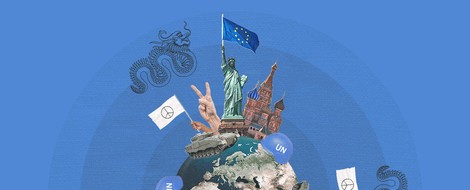Your podcast discovery platform
Curious minds select the most fascinating podcasts from around the world. Discover hand-piqd audio recommendations on your favorite topics.

piqer for: Globalization and politics Global finds
I am an Australian freelance journalist focussing on conflicts, politics, and warzones around the world. I have been working as a journalist for over 5 years, having reported from Australia, Germany, China, Egypt, Palestine, and Ukraine. I am especially interested in the way that new technologies are being used in conflict zones in unexpected and often disturbing ways. During my time working as a journalist, I also co-founded open-source war reporting site Conflict News.
Germany Has Plunged Into Unprecedented Political Chaos
Germany has long been a pillar of stability for the European Union. While many other EU countries have been beset by unstable politics and fractious parties, Germany — especially under Angela Merkel — has carried on forwards with barely a scandal or political drama to be seen.
Until now that is.
In the weeks following last month's German federal election the country has suddenly come to the realisation that it cannot form a government. In the past, grand coalitions of several major parties would work together to form a broad centrist consensus, upon which the country's political direction was built. Now, however, following the shocks of the Euro-crisis, the refugee crisis, Brexit, Trump, and many other small things, German politics has frayed. Large parties, including that of Chancellor Merkel, are losing popularity, and in their place radicals on the far-left and (more disturbingly for Germany) the far-right are gaining support.
Paul Hockenos' article for Foreign Policy looks at how this consensus unravelled and what this means for the future of Germany. It breaks down the internal politics that may very well lead to the end of Merkel's leadership, and the potential for Germany's politics to begin resembling those of its EU neighbours.
As a non-German living in Germany, I do have to wonder, however, if Germany's aura of political stability and risk-averse political culture played a role in creating this crisis. By thinking 'it could never happen here', Germans have failed to account for the messiness of democratic politics. Thus it may be better to see this 'crisis' as a normalisation of the country's politics, rather than an aberration.
Stay up to date – with a newsletter from your channel on Globalization and politics.

sorry, but it's mostly – if not outright "only" – journalists that perceive the political situation these days in post-election germany as "chaos". any reports on statements of german citizens (for example in 'the guardian' recently) indicaye that there is not much hyperventilation going on. much less than during the 'refugee crisis'. interestingly, it's mostly media from the UK and the US that adorn their headlines with 'chaos' and similar words from that drawer. how come?